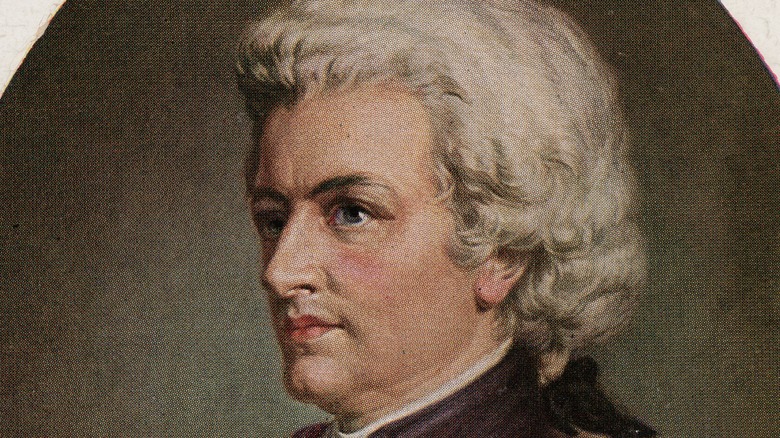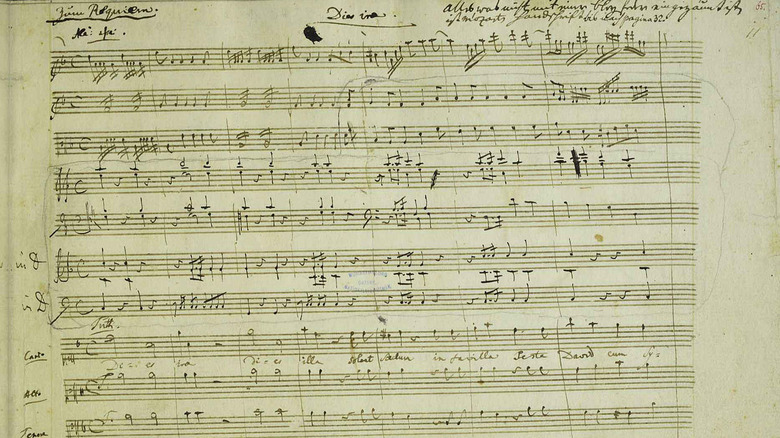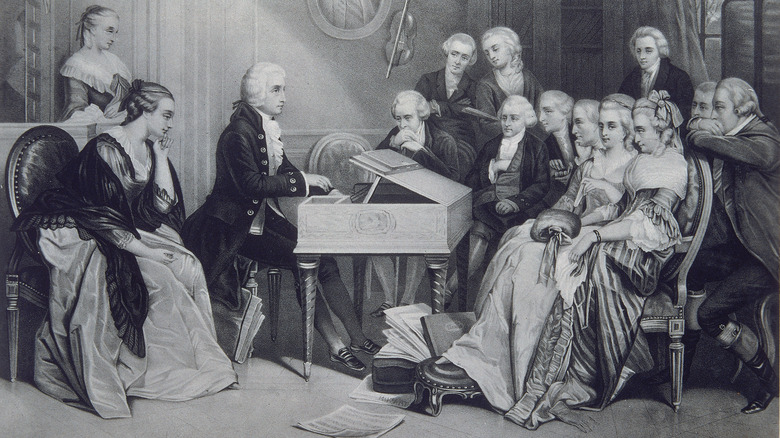This Is What Could Have Happened To Mozart's Final Piece
"On the page it looked ... nothing. The beginning simple, almost comic. Just a pulse, bassoons and basset horns, like a rusty squeezebox. Then suddenly; high above it, an oboe, a single note, hanging there unwavering, till a clarinet took over and sweetened it into a phrase of such delight!"
These words, uttered by the disturbed, rapaciously jealous composer Antonio Salieri in the 1984 film of the dramatic masterpiece "Amadeus," likely served as many people's introduction to Wolfgang Amadeus Mozart's final unfinished work, "Requiem in D Minor." In the film, Salieri was utterly enraged at how such a "boastful, lustful, smutty infantile boy" could produce such magnificent, nigh-celestial music. And it's true, on both points: Mozart was indeed a vulgar person, as evidenced by his scatalogical "love letters" to his cousin Marianne, discussed on The Piano, and his catalog of equally scatalogical songs, described on Medium. He was also, as Salieri might have put it (and 19th-century writers did put it, per ABC Australia) a vessel for a "God-given talent." Even those without musical ears would be hard-pressed to not get the chills at such a stricken, despair-and-pathos filled movement like "Lacrymosa" from "Requiem."
On the other hand, the fictional retelling of Mozart's life and death in "Amadeus" takes a few liberties with events, particularly Mozart's relationship with Salieri. No, Salieri didn't poison Mozart to death, as the The Guardian recounts. And it wasn't Salieri who wanted to pass off Mozart's work as his own; it was someone else entirely.
Mozart's former students finished the 'Requiem' after his death
On November 22, 1791, two days after Mozart's last public performance, Mozart fell ill. There's been speculation about his cause of death for centuries. A 2009 report in The New York Times eliminates a number of possibilities that have been suggested over the years — poison, or syphilis, or rheumatic fever, or a food-borne illness. The Times cites an August 2009 article from The Annals of Internal Medicine which suggests that Mozart died of something far more simple, by modern standards: streptococcus bacteria — strep throat. By December 5, he was dead. He wasn't penniless, as common myth says (he was in the top 5% of wage earners at the time, says Billboard), but he was still caught in his usual cycle of begging, borrowing, and repayment, as numerous letters to friends illustrate.
By all accounts, he suffered horribly in the end: body swelling, pain everywhere, a fever, rashy blisters. All of this, as PBS relates, while he lay in bed singing phrases from "Requiem," straight from his mind, to Franz Süssmayr, an Austrian composer, conductor, and Mozart's copyist and former student. In turn, some friends came by the night before his death and sang bits of "Requiem" back to him.
Even after pushing so hard, though, Mozart only finished the first two movements of "Requiem:" "Introitus" and "Kyrie." Süssmayr and another former student, Joseph Eybler, finished the rest. If they hadn't taken over, the entire piece might have been lost to history.
The person who commissioned the 'Requiem' wanted to steal it
So why did Mozart push so hard to finish "Requiem"? It's all in the name. The piece was a Requiem Mass, the music used during a Catholic funeral. Mozart sensed his impending death, and believed, says Redlands Symphony, that he was committing to paper one final work: his own funeral music, despite the piece being a commission. Per France Musique, Mozart had written his father years prior, saying, "As death is the true goal of our existence, I have formed during the last few years such close relationships with this best and truest friend of mankind that death's image is not only no longer terrifying to me, but is indeed very soothing and consoling."
And the person who commissioned "Requiem"? Count Franz von Walsegg-Stuppach, a known con artist who played musical pieces at festivals and concerts and claimed that he was the composer. He sent a messenger, dressed in all gray, to anonymously commission a Requiem Mass for his deceased wife. The amount he offered, 100 gold ducats, might have been too much for the money-squandering Mozart to pass by.
Once Süssmayr and Eybler finished "Requiem," von Walsegg simply paid Mozart's wife, Constance, as agreed. But for whatever reason, he didn't try to claim the piece as his own. In fact, "Requiem" wasn't performed publicly until 1809, at Franz Haydn's funeral. Perhaps Mozart's own death rescued his work, and von Walsegg couldn't bring himself to follow through on his plot.


